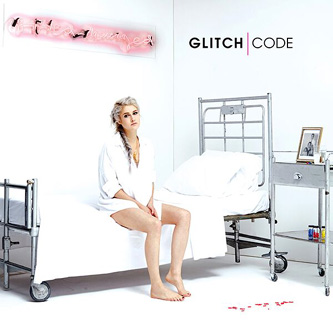 There’s
been a range of superbly produced techno pop-rock coming from the
U.K. in 2016 and you can add the name Glitch Code to the mix.
Pairing the sound and vision of multi-instrumentalist Paul Kirkpatrick
and singer Rachel Harvey, the 2016 Glitch Code album Gifted_Damaged
will clearly be of interest among fans of electro pop legends
such as The Eurhythmics, Bowie and Kate Bush (for example) and, after
hearing the Gifted_Damaged album, the comparison makes sense.
With Ms. Harvey handling all the vocals and Paul Kirkpatrick taking
on the keyboards, drum programming and sound creation, the pair are
joined by a number of musicians and string players including Gordon
Foley (guitars), Julian Todd (bass), David Williamson
Smith (drums) and other players. Informing us about the Glitch
Code story, Paul tells mwe3.com, "The
core of Glitch Code is myself and Rachel Harvey. I met Rachel when
we were both playing on the same bill in different bands and I really
liked her voice and thought it would suit an idea I had for a new
project which became Glitch Code. As Rachel is also a TV actress,
it took us a few years to get the project really off the ground and
then just when we got up and running Rachel had some health problems
which put us on hold for 18 months or so. However, I used that time
to rewrite some of the original tracks we had recorded for the project
and add some new material to form more of a cohesive sound. Gifted_Damaged
explores the fine line between genius and madness that so often affects
those who are creatively successful. I’m sure everyone reading
can relate to someone they know, famous or not, who they would recognize
as both gifted and damaged." Extra
mention must go to the excellent packaging in which the CD and inserts
are packaged in a book like case filled with song lyrics and unusual
sick room setting pics of Ms. Harvey (see story below). Dedicated
to all those who are gifted and damaged, the twelve track CD offers
a potent mix of techno pop-rock, electronic dance grooves and hard
rock sounds. With the release of Gifted_Damaged, Glitch Code
establishes itself as a name that music fans will watch and take further
notice of. www.Glitch-Code.com
There’s
been a range of superbly produced techno pop-rock coming from the
U.K. in 2016 and you can add the name Glitch Code to the mix.
Pairing the sound and vision of multi-instrumentalist Paul Kirkpatrick
and singer Rachel Harvey, the 2016 Glitch Code album Gifted_Damaged
will clearly be of interest among fans of electro pop legends
such as The Eurhythmics, Bowie and Kate Bush (for example) and, after
hearing the Gifted_Damaged album, the comparison makes sense.
With Ms. Harvey handling all the vocals and Paul Kirkpatrick taking
on the keyboards, drum programming and sound creation, the pair are
joined by a number of musicians and string players including Gordon
Foley (guitars), Julian Todd (bass), David Williamson
Smith (drums) and other players. Informing us about the Glitch
Code story, Paul tells mwe3.com, "The
core of Glitch Code is myself and Rachel Harvey. I met Rachel when
we were both playing on the same bill in different bands and I really
liked her voice and thought it would suit an idea I had for a new
project which became Glitch Code. As Rachel is also a TV actress,
it took us a few years to get the project really off the ground and
then just when we got up and running Rachel had some health problems
which put us on hold for 18 months or so. However, I used that time
to rewrite some of the original tracks we had recorded for the project
and add some new material to form more of a cohesive sound. Gifted_Damaged
explores the fine line between genius and madness that so often affects
those who are creatively successful. I’m sure everyone reading
can relate to someone they know, famous or not, who they would recognize
as both gifted and damaged." Extra
mention must go to the excellent packaging in which the CD and inserts
are packaged in a book like case filled with song lyrics and unusual
sick room setting pics of Ms. Harvey (see story below). Dedicated
to all those who are gifted and damaged, the twelve track CD offers
a potent mix of techno pop-rock, electronic dance grooves and hard
rock sounds. With the release of Gifted_Damaged, Glitch Code
establishes itself as a name that music fans will watch and take further
notice of. www.Glitch-Code.com
mwe3.com presents an interview with
PAUL KIRKPATRICK OF
GLITCH CODE
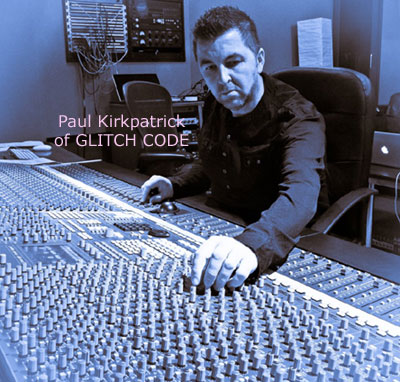 mwe3:
Can you tell us where you’re from originally in the U.K. and
where you live now, and what you like best about it? What are some
of your favorite cities and countries to visit?
mwe3:
Can you tell us where you’re from originally in the U.K. and
where you live now, and what you like best about it? What are some
of your favorite cities and countries to visit?
Paul Kirkpatrick: I’m originally from a town called Corby,
which is in the county of Northamptonshire and I still live near there
today in a small village called Weldon. I like living in a village
as it’s good to get away from the hustle and bustle of big cities
and have time to think and create. Rachel is from a nearby village
called Orlingbury, but currently lives in London.
I have traveled extensively around the UK and the World and spent
several years in the US and Germany and I think that traveling and
visiting other cultures feeds some of my creativity. I’ve spent
time in the Middle East and love the vibrant culture and sounds you
could experience there in more peaceful times.
I spend a lot of time in London which is one of my favorite cities
but I also love being near the sea so often visit coastal towns around
the UK for a bit of rest and relaxation. Around Europe I like to visit
Freiburg in Germany where I have some great friends and I always enjoy
the Nordic countries. In the US I’ve been lucky enough to visit
most of the major cities and spent a lot of time in New York, Chicago,
Milwaukee, Orlando, West Palm Beach and San Francisco.
mwe3: What’s your background in music who were your big
musical influences? What do you think about the state of music today?
What instruments do you play on the Glitch Code album? Are you kind
of a gear head of sorts?
Paul Kirkpatrick: There was always a piano in my parents’
house when I was growing up and my older sister was having lessons
but I would often hijack it and teach myself to play, only eventually
having lessons in my teens when I wanted to play a bit more seriously
and understand what I was actually playing musically.
My musical influences are many and varied. David Bowie, Kate Bush,
Gary Numan, David Sylvian, Brian Eno, Bill Nelson as well as bands
such as Kraftwerk, Can, Depeche Mode, Simple Minds, Talk Talk, Pink
Floyd etc. to name but a few. I also listen to a lot of classical
music and buy a lot of movie soundtracks. I have quite an extensive
vinyl and CD collection that has a great variety of artists and genres.
I will listen to most music and love discovering something new and
of course I’m listening from the production side as well to hone
my producing skills. Production wise I listen a lot to the techniques
of Tony Visconti, Flood, Eno, Nigel Godrich, Hugh Padgham, Chris Lord
Alge, George Martin, Phil Spector, Eddie Kramer and Steve Lillywhite
On the Glitch Code album, I play piano, synths/keys and on a couple
of the tracks drum programming/sound design. I am a complete gear
head but have noticed in recent years a lot of my physical gear has
given way to soft synth and plug-ins. I still have a few of my original
synths and use them quite extensively but with soft synths like Omnisphere
2 out there the possibilities for sound creation are limitless!
mwe3: How did you form Glitch Code and what were some of the
events musical or otherwise that brought the group together? What’s
the inside story behind the Glitch Code album Gifted_Damaged and
when and where was the music written and recorded and where was the
album recorded, mixed and mastered and how did you arrive with the
name of the band?
Paul Kirkpatrick: The core of Glitch Code is myself and Rachel
Harvey. I met Rachel when we were both playing on the same bill in
different bands and I really liked her voice and thought it would
suit an idea I had for a new project which became Glitch Code. As
Rachel is also a TV actress, it took us a few years to get the project
really off the ground and then just when we got up and running Rachel
had some health problems which put us on hold for 18 months or so.
However, I used that time to rewrite some of the original tracks we
had recorded for the project and add some new material to form more
of a cohesive sound.
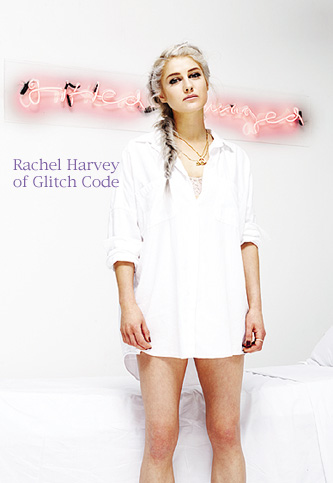 Gifted_Damaged
explores the fine line between genius and madness that so often affects
those who are creatively successful. I’m sure everyone reading
can relate to someone they know, famous or not, who they would recognize
as both gifted and damaged. I’ve taken the premise a little further
on tracks such as “Little Pleasures” which is actually a
vampire story! Live for eternity but never see the light of day! I
try and write most of my lyrics so the listener can interpret them
in a way that relates to them, and it’s often very interesting
when someone says “Oh I love that song about xxxxx” and
I have no clue which one they mean as I wrote it about something completely
different.
Gifted_Damaged
explores the fine line between genius and madness that so often affects
those who are creatively successful. I’m sure everyone reading
can relate to someone they know, famous or not, who they would recognize
as both gifted and damaged. I’ve taken the premise a little further
on tracks such as “Little Pleasures” which is actually a
vampire story! Live for eternity but never see the light of day! I
try and write most of my lyrics so the listener can interpret them
in a way that relates to them, and it’s often very interesting
when someone says “Oh I love that song about xxxxx” and
I have no clue which one they mean as I wrote it about something completely
different.
The album was written in my home studio and recorded in a variety
of London studios. Most of the strings were recorded at Dean Street
Studio’s in London (formally Good Earth Studios) which of course
used to belong to Tony Visconti and David Bowie, amongst many others,
have recorded there. I was lucky enough to meet Tony while we were
there as he was over working on the Kaiser Chiefs album. The vocals
were recorded at Tile Yard studios in London and we mixed it there
as well with my mix engineer Russell Focus. Mastering was done at
Alchemy Mastering in London by Barry Grint who has mastered everyone
from Elvis to Radiohead and is a great guy to know and learn from.
He also cut the vinyl and the experience of watching it being cut
on the lathe at Alchemy was one of the highlights of the whole experience
for a tech head like myself
The name of the band came from my background in computing and is a
reference to a lot of the glitchy electronica we bury in the tracks.
In computing it’s something in the code that is causing a blip
in a game or program.
mwe3: How did you assemble the band for the Glitch Code album?
There’s some great guitar work by Gordon Foley. Who else was
key to the album production and studio sound?
Paul Kirkpatrick: Well Gordon and I have been playing in bands
together since we were teenagers so we just have a great understanding
of how the other one is thinking about sounds and parts. I will give
him some ideas like “what about an ebow here, or a power riff
there” and he interprets it perfectly sending me loads of ideas
that we work through then finalize. We also have a little trick we
use with tone and stereo imaging when we record which gives the guitar
sound that nice fullness.
Bass is put down by another friend of mine, Julian Todd, who I have
known since we were small children and his playing style is influenced
by the music we both grew up with. On the album there is a mixture
if fretless, six string, five string and normal bass and Julian is
such a prolific player we get everything down in one or two takes.
Drums are played by another old friend of mine, David Williamson-Smith
who I have known since I was a teenager and who has played in a few
bands we were both connected with. David is also a big fan of Steve
Jansen and Mel Gaynor so it was easy for me to say how I wanted things
to sound as he gets my references very easily. We recorded all the
drums in my studio using a Roland TD30 kit through Superior Drummer
2.0 and then in the mix studio we recorded other snares etc. to overlay
on some of the bigger drum parts using drum triggers.
I’ve used a string quartet on a lot of the tracks but also there
is Cello on most tracks played by the wonderful Rachel Dawson who
I met in Dean Street at the original sessions and who just got what
I was trying to do. We layer cello parts on most of the album and
Rachel is a prolific player so very quick and easy to work with.
On backing vocals, we have Felicity Hunter. I met her through Russell
Focus and her voice has a fragile edge to it that I thought perfectly
compromised Rachel’s. I think you really hear it in tracks like
“Mask” and “White Room”. There’s also a gospel
choir on “Bleed Out” provided by LJ Voices.
mwe3: Tell us about the amazing CD packaging for Gifted_Damaged.
Who put it all together and how did you decide on such an impressive
package design? Just the packaging alone should win some kind of award.
Is the album available in other formats too?
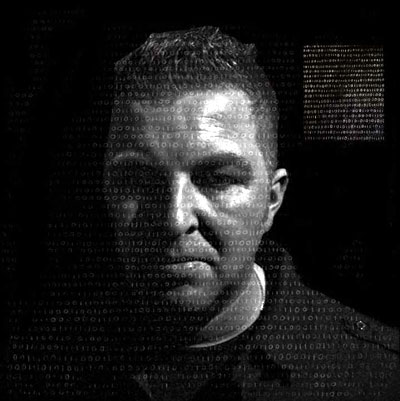 Paul
Kirkpatrick: Thanks for the recognition of the packaging. I wanted
to produce something special as I think nowadays music can be quite
throwaway in its digital format. Growing up I loved buying a physical
product and reading the sleeve notes and seeing where it was recorded,
what kit was used etc. etc. and that has kind of disappeared in recent
times. So I came up with the idea of a book format and worked with
a very well-known British designer, Laurence Stevens, to design the
product and imagery, logo etc. Laurence designed the iconic Eurhythmics
album covers and has worked with some amazing acts. He got the music
and the concept really quickly and we worked with a manufacturer called
Something Else to bring the product to life. I’m very happy with
the final product and it really has a quality feel to it.
Paul
Kirkpatrick: Thanks for the recognition of the packaging. I wanted
to produce something special as I think nowadays music can be quite
throwaway in its digital format. Growing up I loved buying a physical
product and reading the sleeve notes and seeing where it was recorded,
what kit was used etc. etc. and that has kind of disappeared in recent
times. So I came up with the idea of a book format and worked with
a very well-known British designer, Laurence Stevens, to design the
product and imagery, logo etc. Laurence designed the iconic Eurhythmics
album covers and has worked with some amazing acts. He got the music
and the concept really quickly and we worked with a manufacturer called
Something Else to bring the product to life. I’m very happy with
the final product and it really has a quality feel to it.
The other format I really wanted to release the album on was vinyl
and we have teamed up with Plane Groovy to produce a 10 track version.
Again we have worked hard on the packaging to include lyrics etc.
and it’s great having the album in these formats to physically
hold and play. The sound quality is so much better than the overly
compressed digital format that I can see why vinyl is now popular
again,
Digitally there is an iTunes version which features 11 tracks, as
we wanted to keep something different about each version and of course
a streaming version for Spotify etc.,
mwe3: “Glimmer” is a great way to start the album.
Is the song about relationships or trying to salvage a relationship?
Are many of the songs on Gifted _Damaged about relationships?
Why did you start the album with “Glimmer”?
Paul Kirkpatrick: I put Glimmer first because I think it encompasses
the whole Glitch Code sound. It has everything from the softness of
the cello and opening baritone guitar to the manic sequencers and
big guitars and drums with a great vocal from Rachel. It will also
be the first single from the album and we’ve just finished editing
a video for it which really lifts the energy of the track.
It’s not necessarily just about relationships, it’s a song
about staying positive in everything you do as there is always a chance
to turn things round. I was lucky enough to work for a mental health
charity in the UK and see people with severe mental health issues
recover and go on to lead fulfilling lives also helping others, so
the song is about hope and letting go of the past.
mwe3: Track 2 on Gifted_Damaged is “The White Room”.
The song has excellent dynamics. How did you come up with the title
and what is the symbolism behind the title and lyrics?
Paul Kirkpatrick: “The White Room” is a song that
could be about several things but was actually inspired by a documentary
I saw about “locked in syndrome”, where a person can be
totally aware of their surroundings but unable to communicate, except
maybe with an eye movement for example. Similar to a comatose scenario
where no one is really sure what the victim can see, hear or recognize.
The “white room” represents a purgatory between life and
death and physically would be a sterile hospital room with machines
keeping someone alive in the ether. I think the lyric “Can't
breathe, I can't breathe, I’m dreaming deeper” aptly describes
the situation. Of course it can also be seen as a metaphor for not
being able to express yourself in a given situation so again I leave
it to the listener to decide.
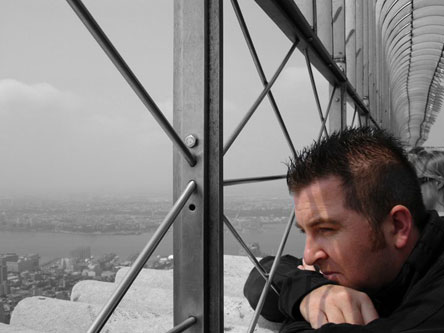 mwe3:
Tell us about “Little Pleasures” which is track 3 on Gifted_Damaged.
Is “Little Pleasures” a good example of writing from
personal experiences?
mwe3:
Tell us about “Little Pleasures” which is track 3 on Gifted_Damaged.
Is “Little Pleasures” a good example of writing from
personal experiences?
Paul Kirkpatrick: I think I gave this one away earlier in the
interview as my vampire song. I guess I write from both a personal
and third person perspective as I have to make sure the lyric can
be delivered by Rachel and that she can put some meaning to it to
really get it across. The song is really about the little things in
life that we do or take for granted but that can hold us back and
if we really want to change we need to let them go and that can be
hard to do. It’s told through the vampire analogy as making the
transition from darkness to light.
mwe3: I like the way you juxtapose breathing in and bleeding
out on “Bleed Out”. Is that another classic relationship
song? Another great vocal from Rachel too. She sounds like she was
made for that song.
Paul Kirkpatrick: Yes, it’s one of my personal favorites
and was one of the first we recorded for the album. I think the intro
melody and the mournful cello work well together and there are several
dynamic shifts throughout the track which lift it with the message
of the song. It’s a song about trying to undo the damage of previous
relationships by holding on to that someone or something that is special
and working at it to be able to let go of the past. There is a real
80’s vibe towards the end which is one of the dynamics we were
trying to deliver but in an up to date format.
mwe3: Is “Guide Me Home” the more spiritual side
of Glitch Code’s music? Another amazing vocal from Rachel and
the lead guitar work is amazing as well. How did you work out the
arrangement on that track? Do you like writing more hopeful songs
or songs with more cutting edge lyrics?
Paul Kirkpatrick: This song was written in the studio at about
3 am one morning and really came together very quickly. It was originally
going to be called Ad Patres, but as the lyrics developed it became
"Guide Me Home". It is another song of hope and talks about
the relationship between a father and daughter from the daughter’s
perspective. It has a very personal meaning for Rachel and I think
that cuts through in her performance.
Arrangement wise I tried something a bit different with the triple
chorus towards the end being the only chorus sequence as such and
I like to try and vary arrangements to make the songs more multidimensional.
There is a vocal sample that works through the whole track panning
from ear to ear, coming to the fore towards the end which gave a reference
point for the whole arrangement
Lyrically I work in a strange way in that the title usually comes
first and I write around it. Usually I’m looping a passage of
music I have written and the melody and lyrics flow from there. It
can be a very quick process and usually a draft lyric will only take
minutes. I obviously subconsciously channel it from somewhere deep
inside but I have no idea what I’m going to write until I write
it and then sometimes I have to work out exactly what I’m on
about!
mwe3: Is “Black Tears” another autobiographical track
or did you write it for someone? Seems like broken relationships still
haunt the best of us. Can broken relationships drive someone to suicide
or is writing songs about them a better idea?
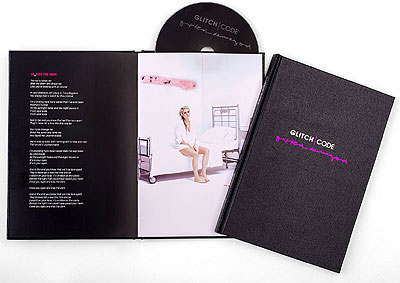 Paul
Kirkpatrick: Yes, "Black Tears" is the darkest song
on the album and was written to reflect the seedy underbelly of society
and the internet. The lyric and vocal delivery have an edgy feel and
each line is also whispered which adds a little sinister touch particularly
when you listen on headphones. The song was actually inspired by the
story of Mary Magdalene and the theory she could have been the wife/lover
of Jesus in what would be the ultimate forbidden love.
Paul
Kirkpatrick: Yes, "Black Tears" is the darkest song
on the album and was written to reflect the seedy underbelly of society
and the internet. The lyric and vocal delivery have an edgy feel and
each line is also whispered which adds a little sinister touch particularly
when you listen on headphones. The song was actually inspired by the
story of Mary Magdalene and the theory she could have been the wife/lover
of Jesus in what would be the ultimate forbidden love.
I think broken relationships could potentially result in suicide particularly
if there is betrayal involved but I also think there always has to
be hope and a lot of this album is about seeing that hope and using
the different gifts we all have to conquer the hurt and move on with
our lives.
mwe3: The title track “Gifted_Damaged” is track seven
on the CD. How did you come up with the title Gifted_Damaged and
why did you put the underscore between the two words? Did you write
the title track for someone or is it autobiographical?
Paul Kirkpatrick: “Gifted_Damaged” is actually about
an autistic teenager I once met who couldn’t communicate with
many people but was an absolute genius when it came to computing,
or more precisely, hacking! He was being held securely because of
his extreme behaviors and it demonstrated to me the fine line between
genius and madness. To his parents he would always be their special
son no matter how damaged he was as they could see through all of
that and a parents’ love is unconditional. I put the underscore
in to reflect the coding element both in this lyric and of Glitch
Code and it also works nicely as a hashtag.
If you look back in history particularly in music and creative crafts
such as acting and art, there are many who we regard as geniuses who
were damaged either by their upbringing or the effects of their success.
This genius defines their craft but ultimately is their downfall.
mwe3: Tell us about track 8 “Monochromatic”. I love
that word. How does it apply to the song lyrics? The song almost borders
on heavy metal rock. Very impressive.
Paul Kirkpatrick: “I see everything, in black and white”
is the opening line and the song has a pseudo religious take on the
surveillance society we live in today. Everything we do, say or type
is monitored or tracked in some way and I related that back to the
so called omnipresence of whatever God you follow.
The song is heavier than the others on the album to really lift the
message of the chorus with a contempt for those who seek to monitor
us.
mwe3: “Mask” sounds like another painful relationship
song. Are we all walking around with masks that prevent us from fully
feeling life and even knowing who we could be? The lines “An
empty feeling, this mirror’s bleeding” is classic.
Paul Kirkpatrick: I think "Mask" is currently both
mine and Rachel’s favorite track on the album and it is about
what we choose to reveal about ourselves to different people and how
the mask we wear can define who we are in the eyes of others but is
not the real person we are inside.
Lots of people hide their true feelings and emotions and never truly
realize their potential because they feel they have to be a certain
way to conform to “normal” society.
It also talks about our hopes and fears and no matter how many friends
you have either virtually or in real life no one really knows what
you are thinking except yourself. I wrote a track around 2005 called
“We Sleep Alone” and this is probably the continuation of
the theme I was working with on that track in that only you can hear
your own thoughts and know who you truly are. Everything else is a
mask you choose to wear. An actor wears multiple masks for a living
but again this often has a toll on their own happiness and who they
really are that they struggle to deal with and often turn to drugs
to help them cope somehow.
It follows the theme of the album about the mask that genius can wear
when actually behind the genius is a tortured soul.
 mwe3:
How did you decide on the song title “Kiss The Dark”? I
guess we’ve all had a relationship like that. “The future’s
unpredictable” is an understatement but it’s a great line.
Love is hopeful till the end?
mwe3:
How did you decide on the song title “Kiss The Dark”? I
guess we’ve all had a relationship like that. “The future’s
unpredictable” is an understatement but it’s a great line.
Love is hopeful till the end?
Paul Kirkpatrick:” Kiss The Dark” is about the unknown
and being brave enough to take a step that has risks but could potentially
be very rewarding, be it in a relationship, or in life in general.
It’s very much a song about hope and embracing the future positively.
Musically it’s quite epic and I thought it would make a good
Bond theme tune!
It’s about staying strong and doing what you believe is right
even if others criticize or try and sway you from your chosen path.
mwe3: Is “Blame” a hopeful song”? “Do
you think I’ve come this far to fail again?” Another
song with some great electric guitar work.
Paul Kirkpatrick: “Blame” is the oldest track on
the album and I rewrote and rearranged it several times over the last
4 years until I was happy with it. I wanted it to progress from the
lush guitars and strings in to the heavy midsection before finishing
with the chorus refrain stripped out. It started off completely with
the glitchy electronica you hear at the beginning and several iterations
of guitars and strings until we got the balance just right. It was
really when Julian added the underlying bass groove that we knew how
the track should progress through another unusual arrangement.
It is about being the bigger person in a relationship or in life and
saying you were wrong but hoping the outcome can change and not wanting
to repeat past mistakes. By taking the blame and laying yourself open
the line “Do you think I’ve come this far to fail again?”
resonates with the message of hope that is prevalent throughout the
album.
mwe3: Why did you close the CD with “Intent”? It’s
another pretty dark song. Is the song about romantic betrayal and
shattered love? Is that one of the more harrowing songs on Gifted_Damaged?
Paul Kirkpatrick: “Intent” was always down as
the final track on the album from day one as I wanted to end the album
on a single piano note as a counterbalance to the big wall of sound
on the rest of the tracks and also this track as it reaches its peak
and the drums bring it all back down to earth. I write music in a
way an artist would paint with many layers and sonic colors which
when you start to peel them back reveal different sounds you never
noticed on first listen. I find this gives the work a longevity and
keeps the listener engaged. There is so much throw away formulaic
music about nowadays that I wanted to do something with a bit more
substance that is not so instant and that people have to discover.
That’s how I grew up listening to music and how I wanted to present
my own songs. I also always write and end to each song as I don’t
like the “fade out” route a lot of songs take and had actually
wrote this “end” for album before I’d even written
“Intent” fully.
“Intent” is harrowing and the chord structure chosen to
be more dramatic in a Neoclassical way. It’s about betrayal and
shattered love, as you say in your question, and it’s also about
questioning yourself and trying to get your confidence and self-belief
back after someone has betrayed you.
The single note at the end of the final piano run is the perfect summing
up of the whole Gifted_Damaged theme as it delays to silence. If you
loop it back to Glimmer the piano fades and the words “Hope springs
eternal” resonate once more.
 mwe3:
I hear you have a solo instrumental album, called
Omertà coming
later in 2016. What other musical projects and other work are you
and Rachel involved in and how do you balance all your activities,
both musical and otherwise? What other work do you have outside of
music or is it music 24/7?
mwe3:
I hear you have a solo instrumental album, called
Omertà coming
later in 2016. What other musical projects and other work are you
and Rachel involved in and how do you balance all your activities,
both musical and otherwise? What other work do you have outside of
music or is it music 24/7?
Paul Kirkpatrick: Yes, I have been working on Omertà
for about a year in between the final production of Gifted_Damaged
and working on the next Glitch Code album. I write constantly
and had a concept for a piece of music based on a film yet to be made.
I said earlier I buy a lot of soundtrack music and it’s something
that has always interested me. The challenge is trying to convey the
emotion of a lyric but just through instruments and their melody/timbre.
It’s a lot sparser than the Glitch Code music and features much
more piano and strings in with the electronica with a few surprises
here and there for good measure!
Outside of music Rachel is also an actress but is currently at university
studying for a degree in Psychology. I work as an IT consultant outside
of music and that obviously feeds my love of tech and gadgets!
We are looking at how to bring the Glitch Code sound to a live audience
and hope to play some gigs sometime this year.
mwe3: With the success of the Glitch Code Gifted_Damaged
album what other plans for the band are you considering for the future?
Are you always writing songs and what kind of album would you like
to make next with Glitch Code?
Paul Kirkpatrick: The next Glitch Code album is already underway
at the writing stage and, as I’m always writing, I have about
30 song ideas ready to expand or delete as we hone the sound of the
next album.
We have just filmed the video for "Glimmer" and hope to
do something visual for "Mask" in the coming months. We
would obviously like to evolve the sound on the next album and for
it to be as well received as Gifted_Damaged and probably a
bit more anthemic, but who knows, it could be we find 10 stripped
down electronica grooves and run with that. I think that’s what
makes making an album so exciting as the journey takes you in many
directions until your finally hone in on your target and end up with
something you can be proud of.



